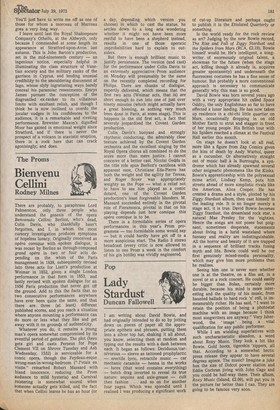Pop
Lady Stardust
Duncan Fallowell
I am writing about David Bowie, and had originally intended to do so by jotting down on pieces of paper all the appropriate epithets and phrases, putting them into a silver top hat, shaking it all about, you know, selecting them at random and typing out the results with a dash between each. It began as follows: Deciduous/carnivorous — sleeve as tattooed prophylactic — erectile lyric, retractile music — car mechanic catamite — henna in the works — lurex (that word contains everything) — butch drag inverted to reveal its true nature: sequins and axle-grease — cult then fashion . . . and so on for another four pages. Which was splendid until realised I was producing a significant work of cut-up literature and perhaps ought to publish it in the Etiolated Quarterly or something.
Is the world ready for the rock review as art? Judging by the new Bowie record, The Rise and Fall of Ziggy Stardust and the Spiders from Mars (RCA, £2.19), Bowie himself would be. He's intelligent, a songwriter of enormously original talent, a showman for the future (when the stage act, killing though it already is, acquires greater spontaneity) and underneath the fluorescent costumes he has a fine sense of humour. But probably a more conventional approach is necessary to communicate generally why this man is so good.
David Bowie was born several years ago with a very appropriate hit called Space Oddity, the only Englishman so far to have effected a lunar landing. He has now taken up residence in a chi-chi little quartier on Mars, occasionally dropping in on old Mother Earth to strut and stagger in front of her young people. His British tour with his Spiders reached a climax at the Festival Hall earlier this month.
On stage he doesn't look at all real, more like a figure from Zap Comics given the kiss of death by Andy Warhol, queer as a cucumber. Or alternatively straight out of music hall a la Burroughs, a syndrome which has already spawned several other enigmatic phenomena like the Kinks. Bowie's apprenticeship with the polysexual mime artist, Lindsay Kemp, puts him streets ahead of more simplistic rivals like the American, Alice Cooper. He has created a drama and a style, plotted by his Ziggy Stardust album, then cast himself in the leading role. It is no longer merely a stage act, it is true. David Bowie becomes Ziggy Stardust, the dreamland rock star, a natural Mae Presley for the 'eighties. Hence the songs are not poses but poignant, sometimes desperate, statements about living in a lurid wasteland where fantasy and reality are indistinguishable. All the horror and beauty of it are trapped in a sequence of brilliant tracks fusing myth and life. Bowie could well be our first genuinely mixed-media personality, which may give him more problems than he realises.
Seeing him one is never sure whether one is at the theatre, on a film set, in a novel or at a rock concert. He could easily be bigger than Bolan, certainly more durable, because his mind is more interesting and the quality of his music, from haunted ballads to hard rock 'n' roll, is immeasurably richer. He has said, "I want to retain the position of being a photostat machine with an image because I think most songwriters are anyway." Very Isherwood, the ' image ' being a vital qualification for any public performer. While I am wielding superlatives with such uncharacteristic abandon, a word about Roxy Music. They look a bit like Bowie. Gold boots, tigerskin 'zippers, all that. According to a somewhat hectic press release they appear to have several degrees apiece. The music? Imagine a juke box the size of Didcot power station and Eddie Cochran jiving with John Cage and you could be half-way there. Their album, Roxy Music (Island, £2.09), will put you in the picture far better than I can. They are going to be famous very soon.








































 Previous page
Previous page